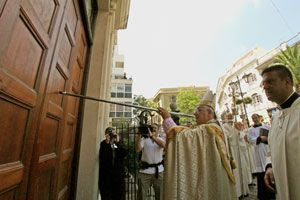‘The Eternal Word from being Strong became Weak.’
O children of Adam! Go on joyfully, be no more faint-hearted. Even though you perceive yourselves weak, ‘Fear not; God himself will come and save you.’ (Isa. 35:4).
God is that strong one who alone can be called strong, because he is strength itself; and whoever is strong derives his strength from him. By a nod he created heaven and earth out of nothing: ‘He spoke and they were made.’ (Ps. 148:5). And did he choose to do so, he could destroy the immense machinery of the universe by a single nod, as he created it.
The Eternal Word, in coming to be made man, wished to conceal his strength. Look at him in the shop at Nazareth, how busily he toils and labors in helping Joseph at his trade. Who can ever attentively consider Jesus, that beautiful youth, fatiguing and exhausting himself to bring into form some rough-hewn piece of wood and not exclaim: But, most sweet youth, art Thou not that God, who by a mere nod didst create the world out of nothing? And how comes it that Thou hast labored now for a whole day, and bathed in sweat, to fashion this piece of wood, yet still Thy work remains unfinished? Who has reduced thee to such a state of weakness? Has a God, then, come to such a pass as this? To make himself loved by men!
Observe him again, at the close of his life bound with cords in the garden, from which he cannot loose himself; tied in the praetorium to a pillar to undergo the scourging; see him with the cross on his shoulders, but too feeble to carry it, and therefore he frequently falls upon the road; see him fixed to the cross with nails, from which he can find no escape; behold him, finally, how, for very exhaustion and weakness, he is already in his agony, drawn near his end, and expires.
He made himself weak, that he might communicate his strength to us, and by this means conquer and subdue the powers of hell. David says that the will to save us and to free us from death is part and property of God’s divine nature. Our God is the God of salvation.
Are we indeed weak? Let us put our trust in Jesus Christ, and we shall be capable of all things: ‘I can do all things in Him who strengthens me.’ (Phil. 4:13).
Take courage, my children, Jesus Christ says to us; if you are unable to resist your enemies: ‘In this world you will have trouble, but be courageous: I have conquered the world.’ (Jn. 16:33). My conquest was to give you the spoils; avail yourselves now of the arms I leave to you to defend yourselves, for you are to triumph.
What are the arms which Jesus Christ has left us? They are two, the use of the sacraments and of prayer. Everybody knows that by means of the sacraments, especially of penance and the Holy Eucharist, are imparted to us the graces which our Savior has merited for us; and experience shows us every day that those who frequent the sacraments easily keep themselves in the grace of God. The Holy Eucharist is called bread, the heavenly bread, that we may understand how the Communion preserves the life of the soul, which is divine grace, just as earthly bread preserves the life of the body.
The other grand means of overcoming temptations is prayer offered to God through the merits of Jesus Christ: ‘Amen, Amen, I say to you, if you ask the Father anything in My name, He will give it to you.’ (Jn. 16:23). And this, we see, happens continually; all those who are tempted and have recourse to God, and invoke him through Jesus Christ, invariably come off victorious.
In a word, we find in Jesus Christ all grace, all strength, all help, whenever we have recourse to him. He lowered himself to nothing; he put off his majesty, glory and power, and took on himself ignominies and infirmities, to make over to us his worth and his virtues, so that he might be our light, our justice, our satisfaction, and our ransom: ‘Who is made unto us wisdom, and justice, and sanctification, and redemption.’ (1 Cor.: 1:30).
The lukewarm will and will not; and therefore remain defeated, because they want the resolute will to please God alone. A resolute will overcomes everything; for when a soul determines really to give itself wholly to God, God immediately gives it the hand and strength to surmount all difficulties that may occur in the way of perfection.
Ah! Let us beg Jesus Christ to impart to us that fire which he came on earth to kindle; so that we may no longer find it difficult to undertake great things for God.
My sovereign God and Redeemer. Grant me light and strength on all occasions to have recourse to Thee, and to invoke Thee whenever I am tempted. Grant it me by the merits of Thy Precious Blood. And thou, O Mary, obtain it for me by the love which thou bearest to Jesus Christ.
(Edited excerpts from St Alphonsus de Liguori, Novena for Christmas in: The Complete Works of St Alphonsus de Liguori. Rev. Eugene Grimm (Ed.)

.JPG)
.JPG)
.JPG)
.JPG)
.JPG)
.JPG)
.JPG)
.JPG)
.JPG)
.JPG)
.JPG)
.JPG)
.JPG)
.JPG)
.JPG)
.JPG)
.JPG)
.JPG)
.JPG)















